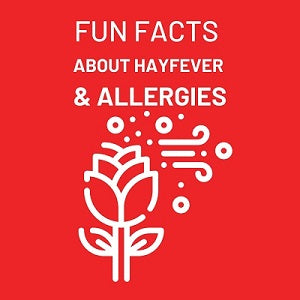
Hayfever is No Joke!
Share
Spring is here! The season for smelling flowers and relaxing in the grass. However, for some it’s the time to protect yourself from perilous pollens.

Sneezing, runny nose, watery eyes, itchiness, congestion or fatigue is what 20% of Australians look forward to. Also known as allergic rhinitis, this irritating condition is aggravated by pollens, dust, mould, mites or animal hair.
For a natural approach shoo allergies away with diet, herbs, supplements and lifestyle changes
Adjusting food can reduce and even eradicate allergic symptoms. First, cut out mucus-producing foods to clear sticky surfaces that allergens love to live in. These foods include dairy, starches, sugar, and gluten. Food allergens can irritate also. Incorporate vitamin C and flavonoid-rich foods to fortify your tissues and soothe inflammation. Some natural anti-histamines include apples, berries, broccoli, capsicum, coriander, onions, papaya and parsley.

Garlic is high in quercetin which desensitises membranes. Raw garlic reduces mucus with its decongesting, anti-histamine hit, warding off secondary infections.
Beta carotene is natural vitamin A that builds the body’s barrier against allergens. Think colorful foods such as carrots, sweet potatoes, pumpkin, mango and leafy greens.
Some herbs reduce susceptibility to allergies.
- Horseradish vinegar gets rave reviews, a base of organic apple cider vinegar with organically grown herbs, horseradish, garlic, turmeric and special spices taken 3 times daily to help treat symptoms associated with hayfever, sinusitis, colds and flu.
- Inhale tea tree or eucalyptus oil - Cover your head with a towel and lean over a large bowl of freshly boiled water which has a few drops of tea tree or eucalyptus oil added. Inhale vapours for 5-10 minutes – this simple steam inhalation naturally treats congestions and clears excess mucus.
- Stinging nettle is a favorite herb. It contains histamine and formic acid which curb hay fever flare ups.
- Albizia is Ayurveda’s top anti-allergy herb. It clears mucus and eases inflammation.
- Astragalus Root relieves symptoms including sneezing and itching and runny nose, it also regulates immunity, building resistance to allergens
- Magnolia is a prime Chinese herb for allergic rhinitis, it may relieve headaches and alleviate nasal inflammation and sinusitis.

Supplements
Vitamin C and bioflavonoids maintain peaceful passages, guarding against hypersensitivity and concomitant infections. Its anti-histamine effect will kick in at around 1,000mg per day for adults.
An old favourite – garlic and horseradish supplements – are perfect for those that don’t fancy eating those herbs in their raw state.
If you’re an allergy sufferer, you’ll be pleased to know the anti-inflammatory and antioxidant activities of quercetin can help. Quercetin not only assists with reducing allergy symptoms but it also has an action on the initial allergic activation, helping reduce the allergic response in the first place. It is histamine, released from mast cells, that initiates allergic reactions. Studies have shown that quercetin relieves mild allergy symptoms by stabilising mast cells and reducing Ig E, a protein that is used as a marker to measure levels of allergic conditions, thereby reducing the release of histamine into the bloodstream and dampening the allergic response.
Some over-the-counter nasal sprays can have unwanted side effects, instead reach for natural xylitol based sprays for soothing relief to combat nasal congestion. Used daily, xylitol nasal spray not only hydrates and moisturises the sinuses but washes away contaminants and pollutants. It is non-addictive, safe for use by children and can be used as often as needed to clean out mucus build-up, moisturize and soothe the sinuses and nasal passages.
Lifestyle

Reducing environmental allergens helps one face the world with more resilience. Vacuum and use an air purifier in your living space regularly. Wash bedding and curtains with hot eucalyptus water. Air filters remove microscopic particles. Avoid animals and chemicals.
It is important to work out which allergens trigger your hay-fever horrors.
Unsure of what sets off your allergies? Peter Balogh, Naturopath with more than 30 years’ experience has the expertise to help you determine what substances provoke your allergies, identify body weaknesses and, with prevention in mind, remove the dread of Spring by strengthening your body and reducing reaction to triggers as the season hits.
Click HERE to find out more about Pete's consultations.
